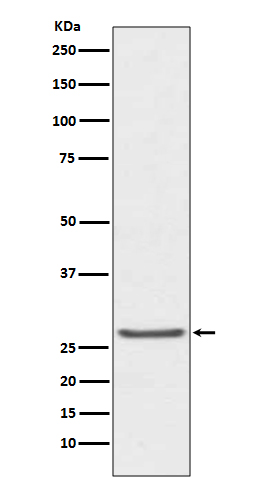
| WB | 咨询技术 | Human,Mouse,Rat |
| IF | 咨询技术 | Human,Mouse,Rat |
| IHC | 1/50-1/200 | Human,Mouse,Rat |
| ICC | 技术咨询 | Human,Mouse,Rat |
| FCM | 咨询技术 | Human,Mouse,Rat |
| Elisa | 1/1000-1/5000 | Human,Mouse,Rat |
| Aliases | EPO; EPA; TIMP1; CLGI; ;TIMP1 |
| WB Predicted band size | Calculated MW: 23 kDa ; Observed MW: 26 kDa |
| Host/Isotype | Rabbit IgG |
| Antibody Type | Primary antibody |
| Storage | Store at 4°C short term. Aliquot and store at -20°C long term. Avoid freeze/thaw cycles. |
| Species Reactivity | Human |
| Immunogen | A synthesized peptide derived from human TIMP1 |
| Formulation | Purified antibody in PBS with 0.05% sodium azide,0.05% BSA and 50% glycerol. |
+ +
以下是3-4条关于 **MUSK抗体(抗肌肉特异性酪氨酸激酶抗体)** 的参考文献,简要概括内容:
---
1. **文献名称**:*Autoantibodies to MuSK in patients with myasthenia gravis*
**作者**:Hoch W, et al.
**摘要**:该研究首次报道了部分重症肌无力(MG)患者体内存在针对MuSK的自身抗体,揭示了MuSK抗体在非胸腺瘤型MG中的致病机制,尤其是与乙酰胆碱受体(AChR)抗体阴性患者的关联。
---
2. **文献名称**:*Clinical correlates with anti-MuSK antibodies in generalized seronegative myasthenia gravis*
**作者**:Evoli A, et al.
**摘要**:分析了MuSK抗体阳性患者的临床特征,发现这类患者多表现为球部肌肉(如吞咽、构音)受累和呼吸肌无力,且对传统免疫治疗反应较差,需调整治疗方案。
---
3. **文献名称**:*Rituximab for MuSK-associated myasthenia gravis: A systematic review and meta-analysis*
**作者**:Díaz-Manera J, et al.
**摘要**:通过系统性综述和荟萃分析,评估利妥昔单抗(抗CD20单抗)治疗MuSK抗体阳性MG的疗效,结果显示其能显著改善症状并减少复发。
---
4. **文献名称**:*The role of B cells and autoantibodies in MuSK myasthenia gravis*
**作者**:Cole RN, et al.
**摘要**:探讨了B细胞和浆细胞在MuSK抗体产生中的作用,提出靶向B细胞信号通路(如BAFF/APRIL)可能成为潜在治疗策略。
---
**注**:以上文献均聚焦于MuSK抗体的致病机制、临床特征或治疗进展,具体细节可通过PubMed或Google Scholar搜索标题获取原文。
**Background of MUSK Antibodies**
MuSK (muscle-specific tyrosine kinase) antibodies are autoantibodies associated with a subset of myasthenia gravis (MG), a chronic autoimmune neuromuscular disorder. MuSK is a receptor tyrosine kinase critical for neuromuscular junction (NMJ) development and maintenance, facilitating acetylcholine receptor (AChR) clustering and synaptic signaling.
In MG, autoantibodies disrupt NMJ function, leading to muscle weakness. While most MG patients have antibodies against AChR, ~40% of AChR-negative cases exhibit MuSK antibodies (MuSK-MG). These IgG4 antibodies directly interfere with MuSK signaling, impairing AChR organization and reducing synaptic transmission efficiency.
MuSK-MG has distinct clinical features compared to AChR-MG, often presenting with prominent facial, bulbar, and respiratory muscle weakness, sparing limb muscles in early stages. Diagnosis relies on detecting MuSK antibodies via cell-based assays or radioimmunoprecipitation, as standard ELISA tests may fail due to conformational epitope specificity.
Treatment differs from conventional MG: acetylcholinesterase inhibitors (e.g., pyridostigmine) are less effective, while immunosuppressants, rituximab, or complement inhibitors (e.g., eculizumab) show better outcomes. Research continues to unravel MuSK’s role in autoimmunity and refine targeted therapies.
Understanding MuSK antibodies has advanced MG subtyping, emphasizing personalized approaches for this rare but severe autoimmune variant.
×